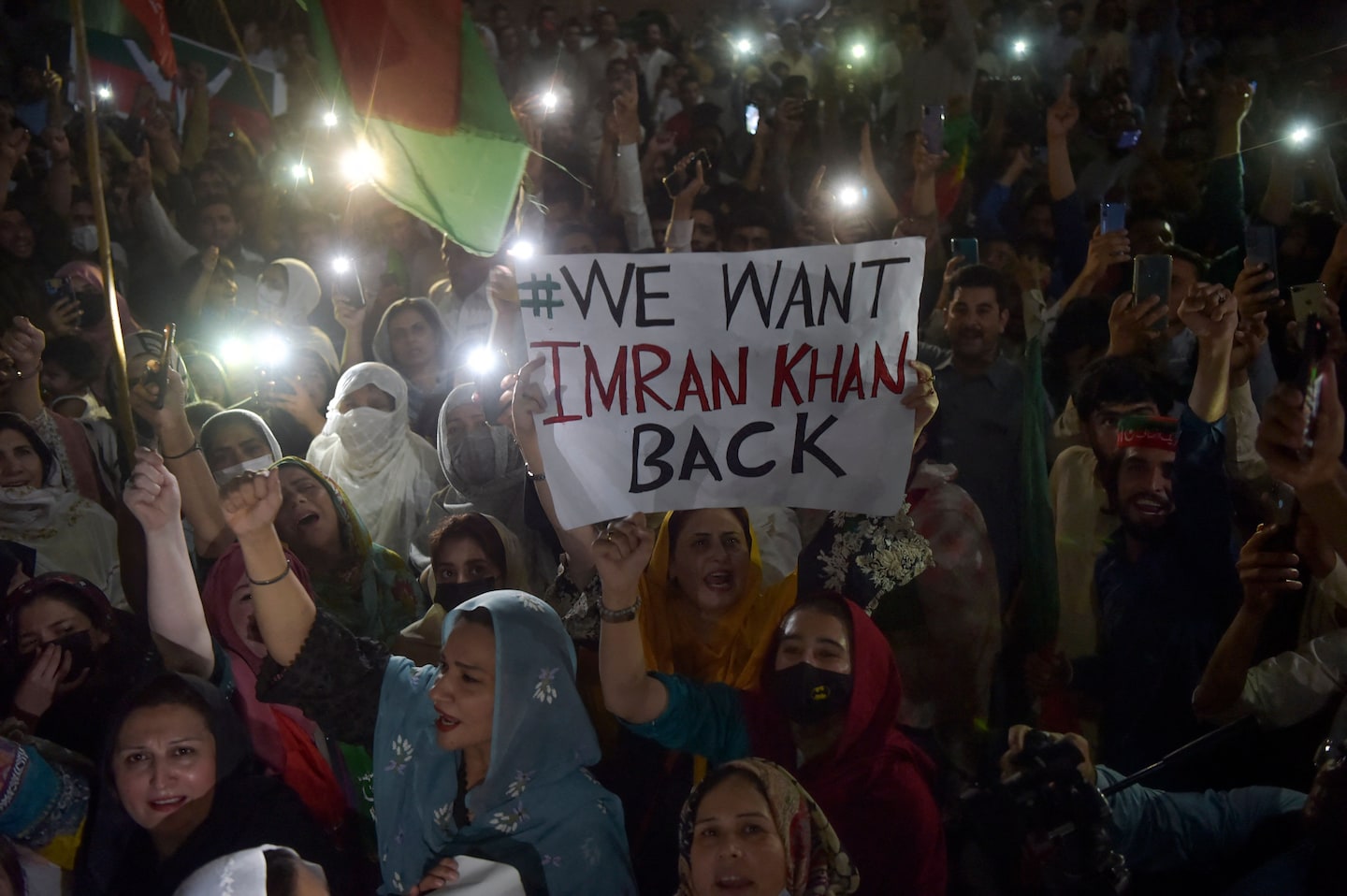Perspective | Pakistan’s prime minister blamed ouster on U.S. meddling. Here’s why.

Khan’s claims had received support from the Russian Foreign Ministry, which released a statement condemning the United States’ “shameless interference” in Pakistan’s political affairs for its “own selfish purposes.” The missive reflected how, although global attention remains riveted on Russia’s invasion of Ukraine, renewed tensions between Moscow and D.C. have also shaped political developments in unexpected ways.
Such a show of unity between Khan and Russian officials against the United States might seem surprising, given Pakistan’s characterization as a longtime American ally. A closer look at the historical relationship between the two countries, however, reveals that Pakistani political leaders have long used popular anti-American sentiment for domestic political mileage, while at the same time playing multiple sides of great-power rivalry.
The United States and Pakistan have been allies for most of the latter’s existence as a nation-state since 1947.
Key moments crystallized this alliance. Pakistan made the first significant moves when it signed two U.S.-backed regional mutual defense and cooperation agreements: the Southeast Asia Treaty Organization in 1954, followed by the Central Treaty Organization in 1955. Much like NATO, these mutual security agreements provided the United States with key military allies during the early Cold War.
Then, in 1971, Pakistan provided a crucial back channel for communication that facilitated the diplomatic breakthrough in U.S.-Chinese relations. A decade later, the country provided a haven for U.S. intelligence activities during the Soviet-Afghan War, arguing that its location would prove indispensable to the United States’ geopolitical aims. Similarly, in the 21st century, Pakistan became a critical ally in the “war on terror,” once again leveraging its strategically valuable location.
In return, beginning in the mid-1950s, Pakistan became one of the largest recipients of U.S. foreign assistance. It has enjoyed the fruits of U.S. military and economic aid, including funding and technical assistance for institutions of higher education, programs of agricultural modernization and services for family planning, as well as the construction of large-scale infrastructure projects such as the Mangla and Tarbela dams. This assistance has long shaped socioeconomic and political life in Pakistan.
Although these exchanges have been beneficial for both sides, distrust has consistently marred this relationship. The United States has often accused Pakistan of playing multiple sides geopolitically, while Pakistan’s government has decried the U.S. relationship with India and its stance on Kashmir, especially in moments of crisis such as the 1965 India-Pakistan war.
A virulent strain of anti-Americanism has also flourished among urban, middle-class Pakistanis. The first public display of this anger occurred less than a year after Pakistan gained independence. In May 1948, more than 3,000 protesters stormed the U.S. Embassy in Karachi to protest American recognition of Israel. Since then, Pakistani citizens have periodically taken to the streets, chanting anti-American slogans and burning U.S. flags. Some even set the embassy in Islamabad on fire in November 1979, in response to a rumor that the United States had taken control of Masjid al-Haram (the Great Mosque of Mecca), a holy site in Saudi Arabia. Several people, including two Americans, were killed.
U.S. foreign policies are at the root of this discontent, with Pakistani citizens arguing that they have had to endure the tragic costs of geopolitical maneuvering between the two countries’ political leaders. However, it also stems from bitterness at U.S. attempts to shape geopolitics and socioeconomic life across the Muslim world.
Perhaps not surprisingly, considering U.S. actions in the region and this suspicion, conspiracy theories accusing the United States of covertly interfering in Pakistan’s domestic politics have also flourished.
After the assassination of Liaquat Ali Khan, Pakistan’s first prime minister, in 1951, rumors circulated that the CIA had played a role as punishment for Khan refusing to secure oil contracts in Iran for American corporations. In 1958, Pakistanis again accused the United States of orchestrating Iskander Mirza’s constitutional coup to install a pro-U.S. regime. In neither case did substantive evidence exist of such meddling.
But that did little to dampen the prevalence of such claims. In 1977, Pakistani Prime Minister Zulfikar Ali Bhutto even went public with such accusations. He alleged that the CIA funded opposition forces in response to the development of Pakistan’s nuclear program and Bhutto’s ostensibly nonaligned foreign policy positions — including his refusal to support the Vietnam War.
A tilt toward nonalignment in the Cold War and away from allegiance to the United States had been a cornerstone of Bhutto’s foreign policy. However, many observers of Pakistani politics saw Bhutto’s allegations of a foreign conspiracy theory as intended to carve out domestic political space in a tense standoff with opposition parties.
Although there was scant evidence to substantiate rumors about these particular instances of U.S. interference, U.S. behavior has, at points, fueled them. For example, some CIA activity in Pakistan has been well documented, such as the collection of DNA samples through a fake vaccination campaign as part of the hunt for Osama bin Laden in the 2000s. These operations have undermined Pakistanis’ trust in the United States to do anything other than safeguard its own interests.
Much like Bhutto about a half-century ago, Khan, prime minister since 2018, also advocated nonalignment. At multiple points, he has held up India’s foreign policy during the Cold War as a model to emulate — surprising, given the enmity between the two countries.
Given this backdrop and the country’s ongoing economic crisis, it becomes easier to see why, as most of the world rushed to condemn Russian President Vladimir Putin after the invasion of Ukraine, Khan instead took a long-planned trip to meet with Putin. Khan’s two-day visit to Russia was the first by Pakistan’s premier in more than two decades, and his government hailed it as a much-needed breakthrough for Pakistan’s economic and energy stability. While in Moscow, Khan secured a major trade deal with Russia to import 2 million tons of wheat and to buy natural gas.
Soon after, Pakistan became one of 35 countries that abstained from voting against the Russian invasion at the U.N. General Assembly.
These moves reflected how, with the United States leaving Afghanistan and deepening ties with India, Khan turned toward an emboldened Moscow-Beijing axis, which is increasingly flexing its muscle. While Pakistan shares a historically strategic friendship with China, the country’s relationship with Russia has vacillated over the past few decades. For his own part, in speeches, Khan often situated Pakistan’s neutrality as a potential tool for avoiding a new Cold War, offering to broker improved diplomatic ties between the United States and China.
Critics see Pakistan’s behavior over the past two months as a clear demonstration of the country moving away from its traditional U.S. alliance. Khan’s government, by contrast, claimed it was pursuing a “balanced and independent foreign policy” that centered the needs of Pakistani citizens over geopolitical concerns.
This context shapes Khan’s accusations of a U.S.-backed ploy to oust him from power. Anti-American rhetoric has long been a potent tool in Pakistani politics. Many of Khan’s predecessors also latched on to anti-U.S. conspiracy theories to gain political clout or to preserve power when faced with domestic political upheaval. Social media only makes the dissemination of these ideas easier.
Deploying these historical tropes made sense for Khan, because charges of a U.S.-backed conspiracy theory let him brand his opponents as “traitors” to national interest and security — rather than just as corrupt politicians. Although this wasn’t enough to stay in power, it may give him a key weapon in Pakistan’s next elections.
This article has been archived for your research. The original version from The Washington Post can be found here.


